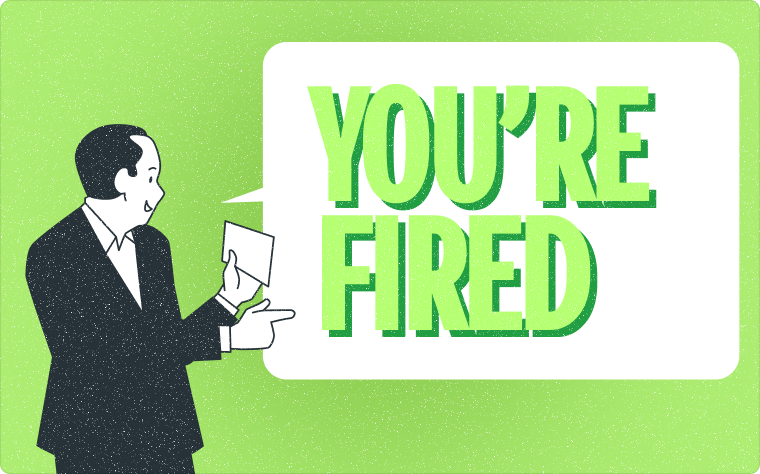17 Fireable Offenses: Top Reasons to Fire Someone

In the dynamic world of employment, certain actions and behaviors can lead to the termination of an individual’s position. It is crucial for both employees and employers to understand what constitutes a fireable offense in the workplace. This comprehensive guide will explore the top 17 reasons why companies may choose to dismiss employees, ranging from poor performance and attendance issues to more serious violations such as dishonesty, harassment, and safety breaches.
By delving into each of these fireable offenses, we aim to provide valuable insight into the expectations and standards that companies uphold, as well as the consequences for not adhering to them. Whether you’re an employer seeking to enforce disciplinary measures or an employee looking to maintain professionalism, this article will shed light on the critical factors that can lead to dismissal.
What Are Fireable Offenses?
Fireable offenses refer to actions or behaviors by an employee that warrant termination from the company.These offenses are typically outlined in company policies and can range from poor work performance to serious misconduct. Poor work performance may include consistent failure to meet job expectations or responsibilities, while serious misconduct may involve harassment, theft, or violations of company policies or laws. Insubordination, dishonesty, and breaches of workplace safety protocols could also be considered fireable offenses depending on the severity and impact on the company.
Get more out of your business
Get the best employee engagement content every week via mailing list

Why Do Companies Fire Employees?
Companies may decide to fire employees for various reasons, including violations of company policies, poor performance, misconduct, and other behaviors that disrupt the workplace environment.
When employees breach company policies, it erodes the trust and integrity essential for a productive work atmosphere. Similarly, consistent poor performance can severely impact the overall output and profitability of a company.
Misconduct, such as harassment or dishonesty, can create a toxic work environment and tarnish the company’s reputation. Behaviors causing disruption can significantly affect team dynamics and overall company culture, leading to a decrease in morale and productivity.
1. Poor Performance
Poor performance can be a significant factor in an employee’s termination, as it directly impacts the company’s productivity and goals. It may include consistently failing to meet performance standards or objectives set by the company.
When an employee’s performance falls below expectations, it not only hinders the overall workflow, but also affects team morale and can lead to missed opportunities for personal and professional growth.
Additionally, unaddressed poor performance can create tension within the workplace and strain relationships with colleagues and supervisors. Employers may institute performance improvement plans, but if the issues persist, it could ultimately result in termination.
2. Attendance and Punctuality Issues
Consistent attendance and punctuality are essential for a productive workplace, and repeated issues in these areas can lead to an employee’s termination. This may include excessive absenteeism or tardiness.
When employees are consistently present and arrive on time, it not only ensures smooth operations but also reflects their commitment and reliability. Attendance impacts team dynamics and work continuity, influencing overall productivity. Conversely, repeated tardiness or absenteeism disrupts schedules, hampers teamwork, and affects overall morale.
Consistent issues with attendance and punctuality can strain coworker relationships and impact customer service. It may also create additional workload for other team members, leading to resentment and inefficiency within the team. Employers have a responsibility to address these issues promptly to maintain a productive and harmonious work environment.
In the majority of workplaces, policies and guidelines regarding attendance and punctuality are clearly outlined, highlighting their importance. Employers often track and monitor attendance records, and frequent issues may result in formal warnings or probation. If the problems persist, it can lead to termination, as it affects the overall functioning of the business.
3. Dishonesty or Theft
Instances of dishonesty or theft, such as falsifying records or stealing company property, are serious offenses that can result in an employee’s termination. Such actions violate the trust and integrity expected in the workplace.
When employees engage in dishonest or unethical behavior, it not only damages the company’s reputation but can also have legal consequences. Dishonesty in the workplace can lead to financial loss, damage to employee morale, and a breakdown in trust among colleagues. If the company suspects theft or fraud, they may have to involve law enforcement and undergo investigations, which can be costly and time-consuming.
From a legal perspective, dishonesty or theft could result in civil lawsuits and criminal charges against the individual involved. Employers must comply with employment laws when handling terminations based on employee conduct. This involves conducting fair investigations, documenting evidence of misconduct, and communicating termination decisions in accordance with company policies and local regulations.
When such incidents occur, companies typically address the issue through an internal investigation to gather evidence and assess the extent of any harm caused. Depending on the severity of the offense and the company’s policies, the employee may face immediate suspension pending investigation or could be terminated with cause. These measures are essential to maintain a safe and ethical workplace, as well as to protect the company’s interests and reputation.
4. Violation of Company Policies
Employees who violate company policies, whether related to social media usage, discrimination, or harassment, may face termination as a consequence. Adherence to company policies is crucial for maintaining a respectful and compliant workplace.
When employees adhere to company policies, it fosters an environment of trust and accountability. Consistent compliance with these policies is essential for ensuring fairness and equity across the organization. It also protects the company from legal liabilities and reputational damage.
On the contrary, violations can lead to serious ramifications, including damage to one’s professional reputation, strained work relationships, and even potential legal actions. Non-compliance with workplace conduct policies can undermine productivity, morale, and overall company culture.
5. Insubordination
Instances of insubordination, where an employee refuses to follow instructions or challenges authority, can lead to termination. Respectful and cooperative behavior is essential for a harmonious workplace.
When insubordination occurs, it not only disrupts the workflow but also undermines the authority of management. This can have a domino effect on team morale and productivity. It sets a negative precedent for other employees, potentially encouraging similar behavior. Insubordination can also create a toxic work environment, leading to conflicts and impacting the overall company culture. Employers have a duty to address insubordination promptly and appropriately to maintain a professional and efficient workplace.
6. Harassment or Discrimination
Harassment or discrimination, whether based on gender, race, or other protected characteristics, can result in an employee’s termination. Creating a respectful and inclusive workplace environment is essential for all employees.
It is crucial for companies to understand the legal obligations and responsibilities when it comes to addressing and preventing harassment and discrimination in the workplace. Employees should feel safe and supported, and any form of harassment or discrimination can have detrimental effects on their well-being and performance. Companies can face severe legal repercussions and damage to their reputation if they fail to address such behaviors effectively. Developing and enforcing clear policies, providing regular training, and promoting a culture of respect and inclusivity are essential steps in preventing workplace harassment and discrimination.
7. Falsifying Documents
Falsifying company records or documents is a serious offense that can lead to an employee’s termination. Maintaining the accuracy and integrity of records is vital for organizational transparency and trust.
When an employee engages in falsifying documents, it not only breaches the trust of the organization but also puts the company at risk of legal consequences.
Employee dishonesty can lead to severe legal ramifications, including fines, civil or criminal charges, and damage to the company’s reputation. In such cases, companies may choose to take legal action against the individual responsible for the falsification.
8. Breach of Confidentiality
Unauthorized disclosure of confidential information or trade secrets can lead to an employee’s termination. Safeguarding sensitive data is crucial for business operations and maintaining trust with stakeholders.
When an employee breaches confidentiality in the workplace, it can have far-reaching consequences. Not only does it violate the trust and contractual obligations between the employer and employee, but it can also lead to legal ramifications.Confidential information breaches can result in lawsuits, fines, and damage to the company’s reputation. It can disrupt business relationships and potentially lead to loss of competitive advantage. Therefore, it is essential for organizations to have clear policies, regular training, and robust security measures in place to prevent unauthorized disclosures.”

9. Drug or Alcohol Use on the Job
Using drugs or alcohol on the job is a severe violation of workplace policies and can result in an employee’s termination. Maintaining a safe and sober working environment is essential for employee well-being and productivity.
Drug or alcohol use in the workplace can lead to impaired judgment, decreased coordination, and compromised decision-making. This not only poses a significant risk to the safety of the individual engaging in substance use, but also jeopardizes the well-being of their colleagues and the overall productivity of the organization.
Such behavior not only undermines trust and professionalism within the workplace, but it can also lead to potential legal implications for the employer if an accident or harm occurs due to the employee’s impaired state. Companies are highly likely to enforce disciplinary actions, which may ultimately result in termination if an employee is found to be under the influence during working hours.
10. Safety Violations
Safety violations, such as disregarding safety protocols or endangering coworkers, can lead to an employee’s termination. Ensuring a safe work environment is a fundamental responsibility for all employees.
Adhering to safety protocols in the workplace is crucial not only for the well-being of the employees but also for the overall productivity and reputation of the company. By following safety regulations and best practices, employees contribute to a positive work culture and minimize the risk of accidents and injuries.
Companies have a regulatory obligation to maintain a safe working environment, as non-compliance can result in legal implications and potential financial penalties.
11. Conflict of Interest
Engaging in conflicts of interest, such as favoring personal interests over the company’s, can result in an employee’s termination. Upholding ethical standards and loyalty to the company is essential for maintaining trust and integrity.
Conflicts of interest in the workplace can inherently erode the credibility and trust that an organization depends upon. When employees prioritize personal gain over the values and objectives of their employer, it not only compromises the company’s interests but also undermines the cohesion and morale within the team. Such behavior can lead to legal ramifications, tarnished reputations, and significant financial losses for the company. Establishing clear policies and guidelines to address and prevent conflicts of interest is vital in safeguarding the integrity and sustainability of the organization.
12. Poor Attitude
Displaying a consistently negative or uncooperative attitude at work can lead to an employee’s termination.
Fostering a positive and collaborative work environment is essential for employee morale and productivity. When individuals express negative attitudes, it can adversely impact team dynamics, leading to a decrease in cooperation and communication. Such behavior can breed resentment and discord among colleagues, disrupting the overall synergy within the team.
Interventions such as:
- clear communication
- conflict resolution training
- a supportive management approach
are crucial to address negative attitudes and cultivate a harmonious work environment.
13. Failure to Meet Deadlines
Consistently failing to meet deadlines or deliverables can lead to an employee’s termination. Meeting deadlines is crucial for maintaining workflow efficiency and meeting organizational goals.
When deadlines are missed, it can disrupt the entire team’s momentum, causing delays in other projects and potentially tarnishing the company’s reputation. This may result in financial losses due to missed opportunities or dissatisfied clients, impacting the overall success of the organization.
In response, management may need to reallocate resources, reevaluate project timelines, or take disciplinary actions as outlined in the company policies, ensuring accountability and preserving the commitment to timely deliverables.
14. Inappropriate Behavior
Engaging in inappropriate or unprofessional behavior, whether towards colleagues or clients, can result in an employee’s termination.
Upholding respectful conduct is essential for a positive and inclusive work environment.
Instances of inappropriate behavior can create a toxic atmosphere, erode trust, and disrupt team dynamics. They can lead to legal liabilities for the company and damage its reputation. As a result, companies have strict policies in place to address and mitigate such conduct. These may include disciplinary actions, sensitivity training, or in severe cases, immediate termination. It’s crucial for employees to understand and adhere to these policies to uphold professionalism and mutual respect in the workplace.
15. Refusal to Follow Instructions
Persistent refusal to follow instructions or carry out assigned tasks can lead to an employee’s termination. Demonstrating a cooperative and adaptable approach to work assignments is vital for organizational effectiveness.
By defying instructions and neglecting their responsibilities, employees may disrupt the flow of work and create barriers to achieving the company’s objectives. Not only does this impact productivity and efficiency, but it can also erode team morale and create a negative working environment.
Managers may have to spend additional time and effort addressing the consequences of this behavior, detracting from their ability to focus on strategic initiatives. In severe cases, repeated refusal to comply may result in disciplinary action, up to and including termination, to maintain the performance standards and discipline within the workplace.
16. Poor Communication
Consistently displaying poor communication skills, such as ineffective collaboration or unclear interactions, can lead to an employee’s termination. Effective communication is essential for productive teamwork and organizational cohesion.
Poor communication in the workplace not only impacts individual job security but also hampers team dynamics, ultimately affecting organizational performance. Misunderstandings, conflicts, and decreased morale are common repercussions of ineffective communication, leading to decreased productivity and increased employee turnover.
Interventions to improve communication skills include:
- Fostering a culture of open dialogue
- Providing communication training
- Implementing clear communication channels and guidelines
By prioritizing effective communication, organizations can create a positive work environment conducive to growth and success.
17. Gross Misconduct
Engaging in gross misconduct, such as physical altercations or severe breaches of professional conduct, can result in an employee’s immediate termination. Upholding ethical standards and workplace safety is crucial for a respectful and secure environment.
Employers have a legal obligation to address and prevent gross misconduct in the workplace, as it can pose significant risks to the safety and well-being of the employees and the organization’s reputation. Along with the immediate termination of the offending employee, companies may also face liability for failing to address such behavior. It is crucial for companies to have clear policies and procedures in place to address gross misconduct and to ensure a fair and consistent approach to handling such incidents.
Frequently Asked Questions
Can an employer fire someone for one of these offenses immediately?
Depending on the severity of the offense, an employer may choose to terminate an employee immediately for certain offenses such as violence or illegal activities. However, it is recommended to follow proper disciplinary procedures and consult with HR before taking any immediate actions.
Are there any legal implications for firing someone for these offenses?
Yes, there are legal implications for firing someone for any reason. It is important for employers to have clear policies and documentation of the employee’s actions leading up to the termination. Employers should also consult with legal counsel before taking any actions to ensure they are following proper procedures.
What should an employer do if an employee commits one of these offenses?
Employers should follow proper disciplinary procedures and document the employee’s actions. It may be necessary to have a meeting with the employee to discuss the offense and give them a chance to explain their actions. If the offense is severe, it may be best to involve HR and legal counsel to determine the appropriate course of action.
What if an employee commits an offense outside of work?
Employers may still have the right to terminate an employee for an offense committed outside of work if it reflects poorly on the company or the employee’s ability to perform their job. It is important to consult with legal counsel and follow proper procedures before taking any actions.
Can an employee be fired for one of these offenses without a warning or previous incidents?
In most cases, it is recommended to provide a warning or have a history of incidents before terminating an employee for one of these offenses. However, if the offense is severe, it may be appropriate to terminate the employee immediately. It is important to follow proper procedures and consult with HR and legal counsel before taking any actions.


